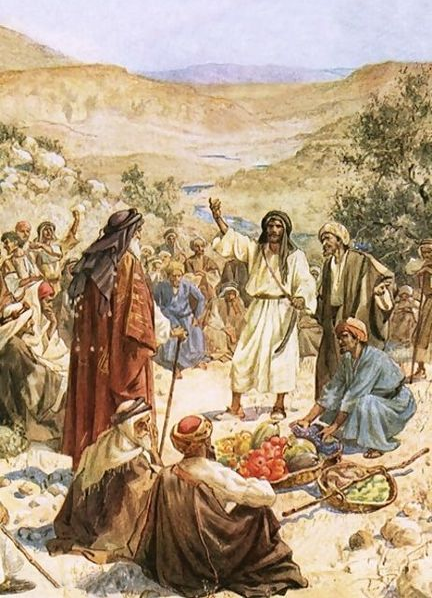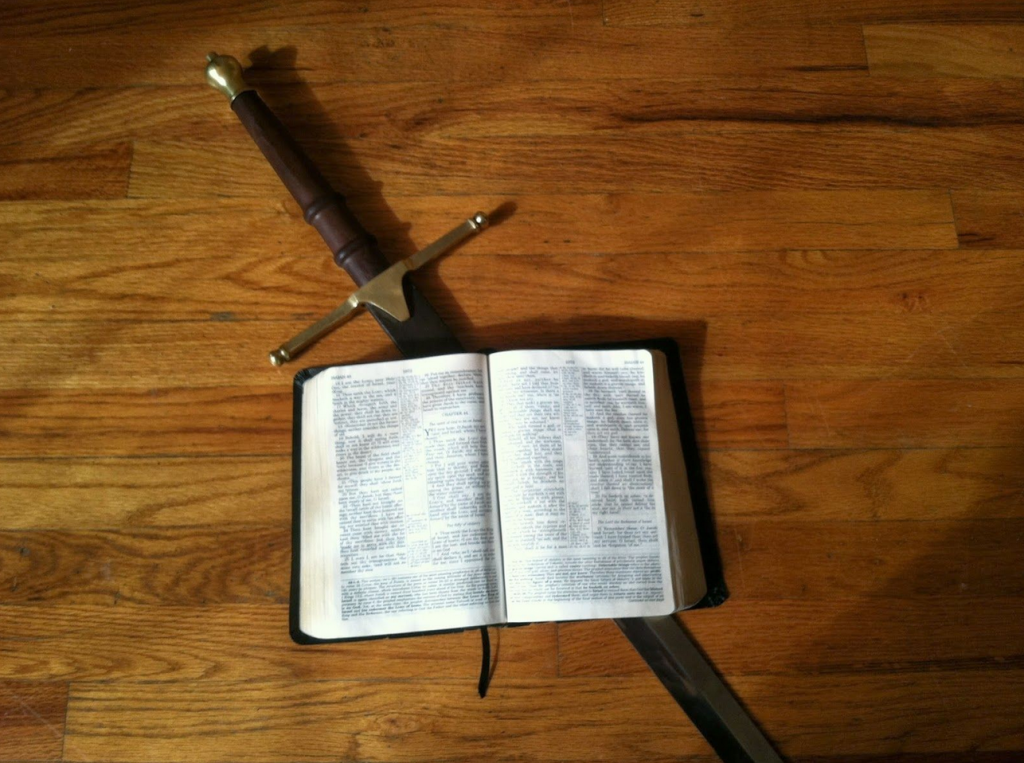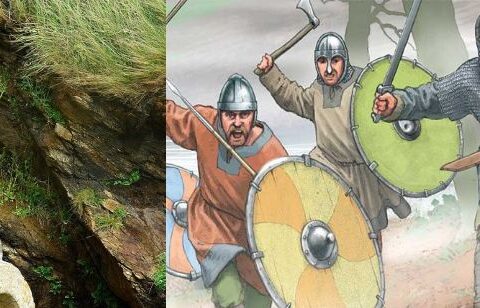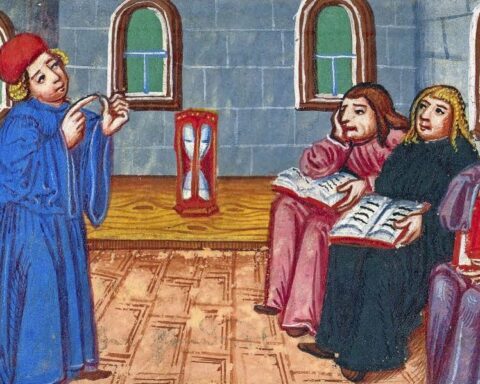Editor’s note: The following is extracted from The Village Tragedy and Other Sermons, by Rev. Clovis G. Chappell, D.D. (published 1921).
Numbers 13:31
While this whole story is our subject, I want to call your especial attention to Numbers, thirteenth chapter and thirty-first verse: “But the men that went up with him said, We be not able to go up against the people; for they are stronger than we.” I am sure we are all familiar with the story of which this text is a part. God has trained a leader named Moses. Moses has been trained for one particular task, that of the emancipation of God’s people, Israel. This man Moses had said to Pharaoh: “Let my people go, that they may serve me.” Under the leadership of God he had rescued them from their tyrant. At the Red Sea God stepped into the waters before them and brought them in safety to the other side. He then led them through the wilderness and brought them to the borderland of their dreams. Arrived here, He bade them go at once and possess the land that He had given them.
But instead of going at once, they appointed a committee. Now, I have no objection to committees in particular, but many a good cause has been committeed to death. I say they appointed a committee, a committee of twelve. It was the work of this committee to go and spy out the land and to bring back a report.
The committee went according to instructions. They spied out the land. But when it came time to make a report they did not all agree. There was a majority report and a minority report.
The majority report was signed by ten members of the committee. You have read it, I suppose. If you have you have read one of the dreariest documents ever penned. It ran something like this:
Whereas we have spied out the Land of Promise.
And whereas we have discovered certain facts about the land that God Himself did not know,
To wit: that it is inhabited by giants;
And whereas we have come to realize that God was mistaken in thinking that we could ever possess it.
And whereas, we have learned that He overrated both His own power and ours;
Be it resolved that we give up the task as a wild dream and turn our faces back to Egypt.
There was consternation when that formidable document was read. There was bitterness, disappointment. There was even sobbing. Confusion and clamor were among the people. It was with the utmost difficulty that a young man named Caleb got the floor to read the minority report. This report was signed only by himself and another young gentleman named Joshua. It ran something after this fashion:
Whereas we have spied out the land and have found that it is an exceedingly good land;
Be it resolved that we go up at once and possess it, for we be well able to overcome. The giants there will only be bread for us.
But sad to say, this minority report was tabled by a vast majority and was never taken off the table till the last member of this majority had slipped into his coffin.
That is a pathetic story. It is the story of a generation that threw away its chance. It is the tragedy of a murdered opportunity. It tells how a whole nation deliberately uncrowned itself, looted its own money safe and spoiled its own treasure. It tells how people for whom God had planned great things “limited the Holy One.” It tells how they toiled till they had come to the very hour of their triumph, and then utterly failed. It is the story of how a generation stood face to face with God, who offered them the Land of their Hopes, but instead of taking what He had given, they slipped their hands into their pockets and turned their backs and walked deliberately away.
Now, this story may be old beyond your interest. However, it is as new as anything you read in the newspaper this morning. It is as recent as your last heart’s beat. It is something that is happening over and over and over again throughout all the years. For what tragedy is more commonplace than just this, that men will not claim their best, that they will not achieve their possibilities, that they will not possess their possessions? For mark you, possessions must be possessed or they can never be really ours. God Himself cannot give you what you do not want and will not take. He is not mighty enough to slip character into your pockets while you sleep. He is not rich enough to deposit moral worth for you in any bank in Heaven or earth.
These people would not take what was really theirs. They refused to achieve their destiny. I say it is a most common tragedy. Here is a bright young fellow. He is gifted and attractive. We feel that almost any thing is possible for him, but he makes a bit of a joke of life. One day when he is no longer a romantic young failure, but a prosaic old failure, maybe somebody will ask how it came about. And this will be the answer: He would not take his opportunity. He had a good chance. He threw it away. He refused to claim his own. He refused to possess his possessions.
I am quite sure that the little cemetery in which Grey sang his “Elegy” is not the only one where “some mute inglorious Milton might rest.” I doubt not there are many possible poets that never sing a single song. I am sure that there are many possible artists that never paint a single picture. I am confident that many possible prophets never see a single vision. I am absolutely certain that millions of possible saints die in the Far Country by the swine trough. It may be true that every weed is a possible flower, but many weeds go on from generation to generation without ever any appreciable effort to attain flowerhood. They refuse to possess their possessions.
The Prodigal Son had a brother. You remember him, I am sure. He never left his Father’s House. He never went into the Far Country. He stayed at home and worked. “Now the elder son was in the field” — that’s the way the story starts. He was out where the wheat waved in billows. He was out where the hands grow hard with toil and the face wet with sweat. This Elder Son remained at home and worked.
What a rich experience he must have had. That is what we are ready to say. But don’t be too sure. Hear him tell it:
“. . . . Lo, these many years do I serve thee, neither transgressed I at any time thy commandment; and yet thou never gavest me a kid, that I might make merry with my friends.”
Did you notice what he has said? He is telling us that all these toil-filled years have been absolutely fruitless years. He is informing us that though he has remained at home, that though he has lived in his Father’s House, he has never really got anything out of it at all. He is saying, “I have lived in the church five years, ten years, twenty years, and have never been blessed or helped in the least. I have heard men speak of the joy of answered prayer, but I have never known that joy. I have heard them talk of the conscious presence of Christ, but that to me is an unknown tongue.”
Now, notice, will you, the Father’s answer: “Son, thou art ever with me, and all that I have is thine.” What is he saying? He is telling this son of his that the fact that he has received nothing is his own fault. What might he have received? “Thou art ever with me” — he might have had the constant presence of his Father. “All that I have is thine” — he might have enjoyed the infinite resources of his Father.
What was the matter? He would not claim his own. So though he was a son, he lived as a slave. Though the Water of Life was rippling at his very feet, he never stooped to kiss the shimmering spring upon the lips. Though the Bread of Life was within easy hand clasp, he never took and tasted for himself. He refused to take his own.
So these Israelites failed years ago. God had already given them the Land, but though He had given it to them, they would not take it. They failed miserably. They threw their chance away. Why?
First, they failed because they had no faith. “Faith,” you are ready to say, “that’s a theological word. That’s a Bible term.” Well, they failed, then, because they had a keener sense of the difficulties than they had of the presence and power of God. They saw the giants more clearly than they saw the Lord. The man who does that in any religious undertaking will always fail.
Mark you, this does not mean that the man of faith is to ignore or belittle the difficulties. Caleb and Joshua saw the giants just as clearly as did the ten. But the difference was this, the ten saw the giants only, and in their presence they themselves looked like grasshoppers. Caleb and Joshua saw the giants and saw God opposing the giants, and that made their antagonists look like grasshoppers. These men failed then for lack of faith. They had no worthy creed. I know men are accustomed to make flings at creeds today. But no man will ever be a mighty man without a mighty creed. If you believe nothing you will accomplish nothing.
Look at this picture. A ship is going to pieces in a stormy sea. It has been the plaything of the tempest for fourteen days. The hearts of the strongest have failed. But a little Jew steadies himself upon the deck and lifts his voice above the shriek of the wind and the rumble of the thunder and cries: “Be of good cheer.” And then he gives the secret of his cheer:
“There stood by me this night an angel of God,….
“Saying, fear not, Paul….
“Wherefore, sirs, be of good cheer; for I believe God….”
He proceeds to recite his creed in the teeth of the tempest.
Now, that is heroic conduct, I take it. How are you going to get such heroic conduct? You must have Paul’s mighty creed. You will get such conduct in no other way. You cannot grow a giant redwood tree in an oyster can. You cannot float an ocean liner in a mud puddle. You cannot bring daylight out of midnight with a tallow dip. You can not drive the machinery of the world with an icicle in the fire box. If you win mightily, you must believe mightily.
The second reason why these people failed was for lack of a wholesome self respect. They had no high and holy self esteem. They were in their own eyes as grasshoppers. For this reason we do not wonder at the opinion that their enemies had of them — “We were in our own sight as grasshoppers, and so we were in their sight.” Of course. If you have a contempt for yourself the other fellow will join with you in your contempt. Treat your own church with contempt and your friend and the community will be ready to share your contempt with you.
Now, I believe that one thing the church peculiarly needs today is a new baptism of self respect. We need a new sense of our importance, yes, of our supreme importance. This institution that we call the Church is important enough for Jesus Christ to purchase it with His own precious blood. It was important enough for Him to build Himself into it. It was important enough for Him to declare that He would build it even in the midst of opposition, and in spite of opposition. “I will build my church,” He says, “and the gates of hell shall not prevail against it.”
If you are a Christian, my friend, don’t blush over it. In Heaven’s name, don’t whine about it. If you are a member of the Church, don’t be ashamed of it. You will not belittle yourself by belonging to an institution that has been the salt of the earth and the light of the world through the centuries. It is nothing to blush over to be a part of an institution that has numbered among its members the biggest brains and the hottest hearts that this world has ever seen.
I love thy church, O God!
Her walls before thee stand,
Dear as the apple of thine eye,
And graven on thy hand.
For her my tears shall fall;
For her my prayers ascend;
To her my cares and toils be given;
Till toils and cares shall end.
May the Lord save us from the grasshopper type of saint. The Lord will never be able to take this world with a bunch of Uriah Heeps. Let us rise and stand upon our feet. And when we are too cowardly and too weak to stand up for what we believe, when we catch ourselves groveling and whining in the presence of our enemies — let us not call such cowardice humility. There are many folks in the church too trifling to do anything, and they flatter themselves that they are idle and useless because they are so humble. That is not humility at all. It is a sickening, slimy, snaky caricature of humility. It is an utter want of holy self esteem. It is the least possible like Jesus Christ.
The third reason why they failed was for a lack of willingness to pay the price of success. They did not want to make any sacrifice. They did not want to fight. They wanted the land to be given to them with out their being put to the least bit of trouble in taking it. But that was impossible. God Himself, as I said, can not give a man anything if he will not take it. He has placed before you an open door, and no man can shut it. But you can refuse to enter it if you want to. God will never take you by the nape of the neck and thrust you through it. He will not because He cannot.
These people, I repeat, were not in earnest enough to pay the price, and there is absolutely no hope for a man if he is not in earnest. Everything is possible to an earnest man. Impossibilities literally take to their heels when they see him coming. But the half-hearted individual — nobody is afraid of him. The powers of darkness never take cold feet in his presence.
If you win, heart, remember this, you have got to be willing to pay the price. You have got to be in earnest. God absolutely has no patience with a trifler. There is only one place in the Bible where our Lord is represented as being disgusted. He was not disgusted with even the most degraded of sinners. He bent over that filthy rag of womanhood that was thrown at His feet and said, “Neither do I condemn thee; go and sin no more.”
But there is a case, there was a time when He was disgusted. That was when He looked down and saw a company that had organized themselves into what they called a church. And they nattered themselves that they “were rich and increased in goods, and had need of nothing.” But He saw that they were lukewarm, that they were neither cold nor hot, that they were goody-goody, that they were straddlers, hitters of the middle of the road. And He said, “Because you are lukewarm, neither cold nor hot, I am about to vomit you up.”
All the Promised Lands have been won by the men who were earnest enough to fight. A young man came out of a service in Aldersgate Street, London, one night. Had you met him and asked him about that service he would have told you that he “felt his heart strangely warmed.”
What was the result? He mounted his horse “and rode literally through the Eighteenth Century.” And as he rode the icicles dropped from the eaves of the houses. And as he rode the winter stripped trees put on their verdant foliage. And as he rode the flowers bloomed and the birds sang, and the human heart stood up in the glad consciousness that God had come. And the temperature of the world was changed from wintertime to spring by that one man who got desperately in earnest.
These people were not earnest enough to battle. They were not earnest enough to possess their possessions. For this reason they missed their chance. For this reason they ceased to make progress. For this reason they became wanderers in the wilderness. They became the victims of arrested development.
And how many there are today who are in the same condition. How many of us are not getting anywhere. We are no nearer Canaan, we are no nearer the Land of our Hopes than the day we set out on the march.
I heard a woman tell the other day of a beautiful baby carriage that she saw. And she stooped to get a glimpse of the baby. And she saw an old wizened face. And she asked the nurse in astonishment, “How old is the baby?” And she answered, “Thirty-five years of age.” It had never grown. It had never moved toward its Canaan. For that reason it was somebody’s heartache.
Oh heart, I call to you today in the words of the heroic Caleb, “Let us go up at once and possess it.” We can achieve our own possibilities if we will. We can fulfill our mission of benediction to the world if we will. Let us gird ourselves with a mighty faith, let us brace our hearts with a high and holy self esteem, let us be gripped with a mighty earnestness that will make us glad of any sacrifice. We will enter our Canaan and possess our possessions in no other way.
The Son of God goes forth to war,
A kingly crown to gain:
His blood-red banner streams afar;
Who follows in his train?









